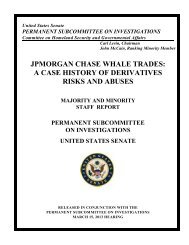JPMORGAN CHASE WHALE TRADES: A CASE HISTORY OF DERIVATIVES RISKS AND ABUSES
JPMORGAN CHASE WHALE TRADES: A CASE HISTORY OF DERIVATIVES RISKS AND ABUSES
JPMORGAN CHASE WHALE TRADES: A CASE HISTORY OF DERIVATIVES RISKS AND ABUSES
Create successful ePaper yourself
Turn your PDF publications into a flip-book with our unique Google optimized e-Paper software.
106<br />
B. Mismarking the CIO Credit Derivatives<br />
The mismarking of the SCP credit derivatives appears to have begun in late January,<br />
accelerated in February, and peaked in March 2012. Recorded telephone conversations, instant<br />
messaging exchanges, and a five-day spreadsheet indicate that key CIO London traders involved<br />
with the marking process were fully aware and often upset or agitated that they were using<br />
inaccurate marks to hide the portfolio’s growing losses.<br />
(1) Mismarking Begins<br />
On January 31, 2012, CIO trader Bruno Iksil, manager of the Synthetic Credit Portfolio,<br />
made a remark in an email to his supervisor, Javier Martin-Artajo, which constitutes the earliest<br />
evidence uncovered by the Subcommittee that the CIO was no longer consistently using the<br />
midpoint of the bid-ask spread to value its credit derivatives. Mr. Iksil wrote that, with respect to<br />
the IG9 credit index derivatives: “we can show that we are not at mids but on realistic level.” 648<br />
A later data analysis conducted by the bank’s Controller reviewing a sample of SCP valuations<br />
suggests that, by the end of January, the CIO had stopped valuing two sets of credit index<br />
instruments on the SCP’s books, the CDX IG9 7-year and the CDX IG9 10-year, near the<br />
midpoint price and had substituted instead noticeably more favorable prices. 649<br />
This change in the CIO’s pricing practice coincided with a change in the SCP’s profitloss<br />
pattern in which the Synthetic Credit Portfolio began experiencing a sustained series of daily<br />
losses. The SCP book lost money on 17 of 21 business days in January, reporting just four<br />
profitable days. 650 By month-end, not only had the book reported losses totaling $100 million,<br />
but there was not a single day in January when the book was cumulatively in the black. 651 In<br />
addition, the book lost money on nine business days in a row at the end of January, producing<br />
collective losses of $81 million. 652 February was equally bleak, losing money on 15 of 21<br />
business days, including on seven consecutive business days at the end of the month. 653<br />
March<br />
continued the pattern, losing money on 16 of 22 business days, including a string of losses -- 15<br />
In this regard, VCG is responsible for calculating / monitoring these reserves and consulting with the business on<br />
such estimates ….”); Subcommittee interview of Elwyn Wong, OCC (8/20/2012).<br />
648<br />
1/31/2012 email from Bruno Iksil, CIO, to Javier Martin-Artajo, CIO, “hello, quick update in core credit…,”<br />
JPM-CIO-PSI 0001229 (Mr. Iksil: “as to IG9, things look much better. Not that we are immune but we can show<br />
that we are not at mids but on realistic level.”).<br />
649<br />
See 5/10/2012 JPMorgan Chase Controllers special assessment of CIO’s marks, January to April 2012, at 17,<br />
JPM-CIO-0003637-654, at 653, excerpted in charts below. The report showed that the two prices used by the CIO<br />
deviated from the midpoint prices by more than one basis point and produced prices more favorable to the CIO. The<br />
IG9 7-year credit index was priced at 102.000, when the midpoint price was 103.500; the IG9 10-year index was<br />
priced at 119.500 when the midpoint price was 120.750. Id. at 653. For more information about credit indices, see<br />
Chapter II.<br />
650<br />
See OCC spreadsheet, OCC-SPI-00000298, reprinted below. Numbers do not reflect restated P&L figures.<br />
651<br />
Id.<br />
652<br />
Id.<br />
653<br />
Id.



